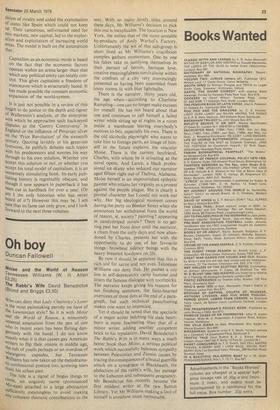Oh boy
Duncan Fallowell Moise and the World of Reason Tennessee Williams (W. H. Allen 3.25)
The Rabbi's Wife David Benedictus (Blond and Briggs £3.50)
VV. ho can deny that Lady Chatterley's Lover Is the most painstaking parody we have of the Lawrentian style? So it is with Moise and the World of Reason, a winsomely venereal emanation from the pen of one who in recent years has been flirting dangerously with the banal. I do not know exactly what it is that causes gay American writers to flip their onions in middle age, the cult of youth perhaps or an overdose of wheatgerm capsules, but Tennessee Williams has now taken up the melodrama Confessional posture too; screwing tears Iront his urban past. The title is a signal of bogus things to c,t)Ine, an ungainly name (pronounced '10-ease) attached to a large abstraction sufficiently meaningless to avoid making any coherent thematic contributions to the
text. With so many lovely titles around these days, Mr Williams's decision to pick this one is inexplicable. The location is New York, the milieu that of the more unstable by-products of Andy Warhol's Factory. Unfortunately the wit of this sub-group is short lived as Mr Williams's crucifixion complex gathers momentum. One by one his fakes take to justifying themselves in their pursuit of heroin, baroque love, creative meaningfulness survivalwise within the confines of a city very convincingly presented as having been assembled from lousy rooms lit with blue lightbulbs.
There is the narrator, thirty years old, the age when-according to Charlotte Rampling-one can no longer make excuses for oneself. He has not heard about that one and continues to call himself a failed writer while sitting up at nights in a room inside a warehouse tearing everybody's motives to bits, especially his own. There is the old alcoholic playwright who wants to take him to foreign parts, an image of himself in the future explains the oracular Moise. There is the current boyfriend, Charles, with whom he is urinating as the novel opens. And Lance, a black professional ice skater who seduced our narrator aged fifteen right out of Thelma, Alabama. Moise herself is an impoverished epileptic painter who retains her virginity as a protest against the people plague. She is clearly a pivotal character but I could not work out why. Her big ideological moment comes during the party on Bleeker Street when she announces her withdrawal from the world of reason, ie, society? painting? appearing in candystriped novels? There is no getting past her front door until the narrator, a chum from the early days and now abandoned by Charles, presents her with the Opportunity to do one of her favourite things: browbeat inferior beings with the heavy breasted lowdown on life.
By now it should be apparent that this is rich soil for satire and not even Tennessee Williams can deny that. He pushes a coy line in self-deprecatory camp humour and litters the famous dialogue with toothpicks. The narrator keeps giving his reasons for not finishing sentences, the faint-hearted overtones of three dots at the end of a paragraph, but such technical pussyfooting makes one want to imprecate.
Yet it should be noted that the spectacle of a major writer belching his stale heartburn is more fascinating than that of a minor writer adding another competent brick to his reputation. David Benedictus's The Rabbi's Wile is in many ways a much better book than Moise, a serious political work which successfully balances sympathy between Palestinian and Zionist causes by tracing theconsequences of a brutal guerrilla attack on a synagogue in Blackheath, the abduction of the rabbi's wife, her passage to the Lebanon and subsequent pregnancy. Mr Benedictus has recently become the first resident writer at the new Sutton Library. Yet Mr Williams making a fool of himself is somehow more memorable.


































 Previous page
Previous page